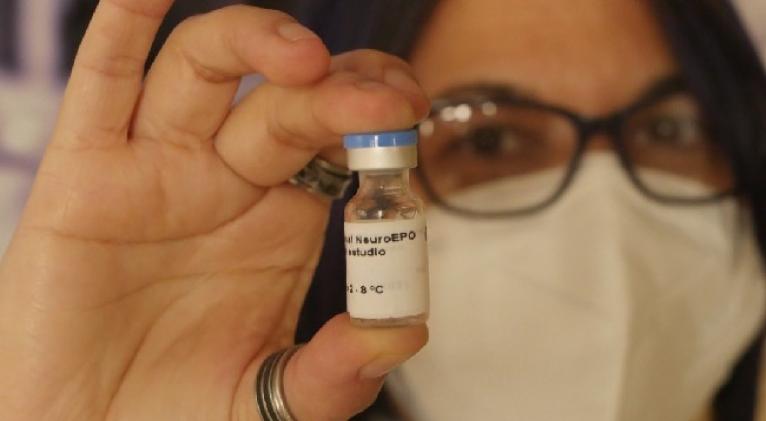Cuba Against Alzheimer: New Challenges and Contributions
especiales

President Díaz-Canel had described what happened on Monday 27th as "a new challenge and a new contribution of Cuban science": the beginning in Cuba, promoted by the Center for Molecular Immunology (CMI), of phase III clinical trial to evaluate the efficacy and safety of the neuroprotective drug NeuralCIM® (trade name of the NeuroEPO molecule) in patients with mild or moderate Alzheimer.
Undoubtedly, this is an event that could mark, for this country and for the world, a before and after in the treatment of this terrible disease, the most common cause of dementia, which afflicts some 55 million people globally and that by 2040 this figure could be more than double.
In Cuba, in the last two decades a prevalence of dementia of 10.2% was observed in people aged 65 and older, 60% of these cases had Alzheimer's. Today, 1.3% of the Cuban population (close to 160,000 people) suffers from dementia, as explained by Doctor of Science Juan Llibre Rodríguez, president of the Cuban Section on Alzheimer's.
It’s a disease that includes nations with a high life expectancy -as is the Cuban case- since age is the main non-modifiable risk factor, the expert added.
21st Century Epidemic
Recent studies confirm that Alzheimer's represents between 50-60% of dementia cases worldwide. It comprehends so-called progressive syndromes that cause impairment of a variety of brain functions: memory, thinking, awareness, language, and planning.
The disease can present with such intensity that it interferes with social and family life, with extensive consequences in the people who care for these patients.
The World Health Organization (WHO) proclaimed September 21st as World Alzheimer's Day starting in 1994, but, given the consequences of this disease and its rapid growth, since 2012 Alzheimer's Disease International (ADI) organization decided create World Alzheimer's Month, whose purpose is to remember that the disease is manifesting itself more and more in a larger number of people, so it’s necessary to emphasize its prevention and detection before it comes to show itself with all its symptoms.
Facing the New Challenge
CMI experts had informed that this new challenge Cuba is considering consists of two clinical studies with NeuralCIM®. One in Havana under the name "Evaluation of the efficacy and safety on the administration of NeuralCIM®/NeuralCIM®-Donepezil vs. Donepezil in patients with mild-moderate Alzheimer's disease”; and the other, in the rest of the country, focused on the "Evaluation on the effectiveness and safety of the nasal administration of NeuralCIM in patients with mild-moderate phenotype of Alzheimer's disease amnestic variant."
Both take Donepezil as a reference because it’s an FDA-approved drug for international use in Alzheimer's dementia.
In Havana, the classification consultations begin to include 413 patients, who will be diagnosed from the clinical and also molecular point of view; while in the rest of the country the process will cover 1,456 patients, to whom the diagnosis will be made only from the clinical point of view because all the necessary technological equipment for molecular tests is unavailable.
This was stated by the Doctor of Sciences and CMI specialist, Leslie Pérez Ruiz, clinical promoter of the NeuralCIM® trials, who specified that phase III clinical trial in the provinces has already begun with the inclusion in some sites and had its opening workshop on January 20th, which was held in the capital on February 24th.
Cuba's Commitment to NeuralCIM®
The race to find a medicine that manages to control the disease, or lengthen its symptoms over time, accumulates more than a century, since the condition was described, scientists have not stopped investigating its causes and possible treatments.
Cuba joins this necessary search, also guided by its efforts for the sake of technological independence, which has already shown substantial results such as the vaccines created to cope with Covid-19.
In March of last year, NeuralCIM® obtained conditional health registration by the regulatory agency (Cecmed) for mild or moderate Alzheimer's disease.
And it was by late 2021 when, in a meeting between Díaz-Canel and Public Health experts and scientists, encouraging study results on the NeuroEpo nasal formulation were presented.
Dr. Saily Sosa Pérez, leading researcher of the clinical trial said that we’re witnessing an achievement of Cuban science that will allow the treatment, with our product, of a traumatic disease, both for the sick and for their relatives, and especially their caregivers, since up to then had spent 27 years caring for Alzheimer's patients, and had never seen improvements in them, but rather slowly and progressively worsening.
The scholar had then commented that there are only six medicines in the world to alleviate the effects of the disease, all of them extremely expensive (treatment for a year can exceed 80,000 dollars). NeuroEpo, she declared, will give us sovereignty, independence, to attend to our patients and also to other patients in the world.
With this trial that longing becomes closer and closer.
Translated by Amilkal Labañino / CubaSí Translation Staff














Add new comment